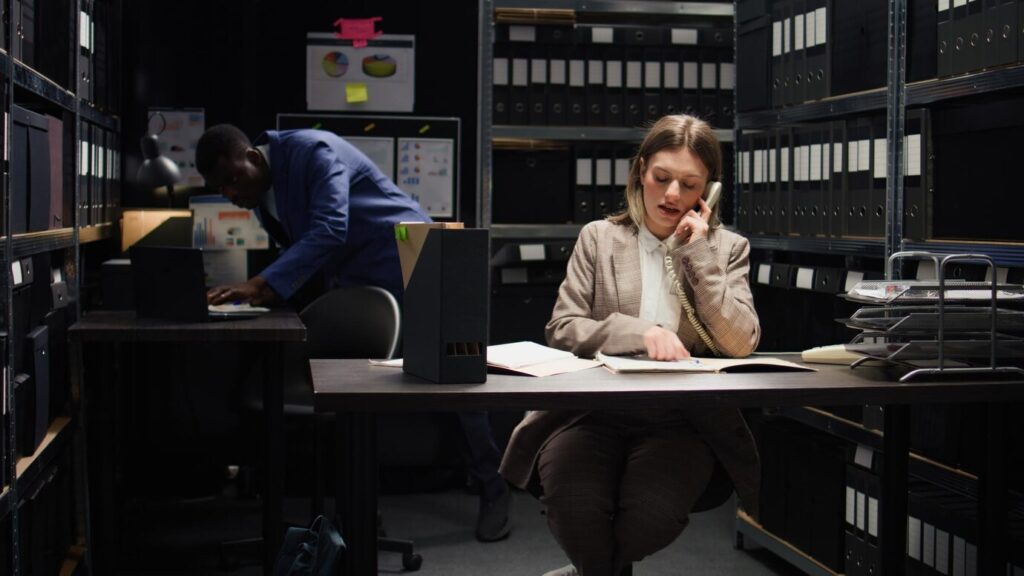When you think of a private detective sitting in a dark room, squinting at old files, it is a thing of the past. However, in today’s digital world, smartphones take better pictures of proof than zoom lenses, and databases reveal secrets faster than any stakeout. Modern local private investigators near me use cutting-edge technology to find facts that would have taken weeks to see ten years ago.
Because of technology, detectives’ methods of gathering information, identifying trends, and solving cases have changed greatly. Experts who know how to use these technologies can get results faster, gather more proof, and gain greater insights than ever before.
The progress in technology has changed not only how detectives work, but also what they can do. Cases that seemed complicated to solve in the past can now be solved with advanced computer analysis. Fraudsters leave digital fingerprints, missing people can be found in data trends, and cheating spouses can’t hide from modern spying technology.
The shift from old school to high-tech investigations
The old way of doing private investigations focused on physical monitoring, paper records, and talking to people. Investigators spent much time in cars, on foot trails, and looking through public records by hand.
Now, investigators can access huge databases from their offices, use GPS devices to monitor suspects from afar, and analyze social media trends to understand how people act. In the past, this was done by teams of agents working around the clock. Now, advanced software and automated monitoring systems do it.
With this change, private investigations are now more efficient than ever before. These days, agents can process information more quickly, virtually cover more ground, and gather proof that could never be found through physical surveillance alone. They look at people’s digital communications, financial transactions, and internet behaviours to fully understand their lives.
Key technologies used by private investigators
GPS tracking devices
GPS tracking is one of the most valuable tools for private investigations today. These gadgets give you real-time information about where you are, allowing you to make detailed moving patterns that show behaviour, connections, and activities. Investigators watch people by attaching small, unnoticeable GPS trackers to their cars, tools, or personal belongings.
Today’s GPS gadgets do a lot more than track your position. They keep thorough logs of routes taken, determine how long people spend in certain places, and send immediate messages when people enter or leave certain areas.
GPS tracking needs to be authorised and follow privacy rules to be legal. Investigators usually use these tools on client-owned cars or property, like company cars or tools. They must stay within the complicated legal lines that change depending on the place and the situation.
Surveillance cameras and hidden Audio recorders
Digital monitoring technology gives agents eyes and ears where they can’t be. High-definition cameras take obvious pictures in various lighting conditions, and high-tech audio recording gear can pick up conversations far away. With these tools, you can record proof that you couldn’t get by just watching people.
Today’s security cameras have features like the ability to see in the dark, sense motion, and let you watch them from afar. Investigators can use computer or smartphone tools to keep an eye on several places at once.
These days, hidden audio recordings are very advanced. Some are so small that they can be hidden in pens, buttons, or USB drives. People being investigated can’t even tell that these recorders are there because they record high-quality sound for extended amounts of time.

Private Detective
Social media and digital footprinting
Social media sites create digital pictures of people’s lives, interactions, and activities. To better understand subjects’ behaviour patterns, social groups, and daily habits, private investigators near me look at Facebook posts, Instagram pictures, Twitter conversations, and LinkedIn contacts. This digital footprinting shows information that people freely give to agents but don’t know they can see.
Investigators use special software to examine social media behavior on several sites simultaneously. These tools track posting habits, examine friend networks, and find links that might not be clear at first glance.
Digital footprinting is more than social media. It also includes review sites, forums, website views, and how often you shop online. By examining what people do online, investigators can get a full picture of their hobbies, habits, and social connections.
Computer and mobile forensics
Text messages, emails, browser history, and location data are just some of the sensitive data that digital devices store. Investigators can use computer and mobile forensics to retrieve lost files, examine how people talk to each other, and find proof that people thought they had deleted their files for good.
Expert forensics software can retrieve data from broken or corrupted devices, circumvent security measures, and record digital activity thoroughly. Investigators examine the information stored in pictures, conversation patterns, and financial activities that occurred using digital records.
Mobile forensics is critical now that smartphones record people’s daily lives. Investigators use call logs, text messages, photos, app usage data, and location records to fully understand what people are doing and how they are connected.
Database access and background check tools
Investigators for hire have access to massive databases that hold public records, court papers, property records, and other government data. These databases collect data from many different sources, allowing agents to do full background checks and find links that would normally take weeks to find by hand.
Some databases are only for certain types of information or businesses, like insurance claims, professional qualifications, or breaking the law. Investigators choose the right sources for each case based on its unique needs.
Drone Surveillance
Investigators can now use unmanned flying vehicles to monitor from above, which was previously too expensive. Drones take high-resolution pictures and movies from points that ground-based surveillance can’t reach, and the subjects can’t tell that drones are there.
Nowadays, security drones have features like night vision, thermal imaging, and GPS-guided flying patterns. They can keep a safe distance from their targets, follow them automatically, and return to base when their batteries run out. For real-time tracking, some drones send live video feeds straight to detectives’ devices.
Local private investigators near me who want to use drones for spying must get the proper licenses and follow the rules set by the Federal Aviation Administration. While doing espionage operations from the air, they must also follow privacy rules and stay out of restricted airspace.
Facial recognition and AI tools
Artificial intelligence changes how detectives examine data and find suspects. Face-matching software looks for the same face in many photos, videos, and files to ensure people are who they say they are and track their movements. These tools can look at vast amounts of visual data faster and more correctly than people can.
AI analysis tools can find patterns in things like behaviour, conversation, and financial activities that people might miss. They mark actions that seem fishy, guess what will probably happen, and point out proof that needs more research. As they handle more data, machine learning systems get better at what they do over time.
Some AI tools are very good at certain kinds of analysis, like recognising voices, drawings, or language patterns. These specialised apps help agents ensure that papers are authentic, determine who sent anonymous messages, and check what subjects say they said.
Legal and Ethical Boundaries
Thanks to technology, private detectives have more duties and more skills. Digital tools give people access to information like never before, but they also raise difficult issues about privacy, consent, and the limits of the law. Investigators must deal with federal and state rules that control privacy rights, monitoring, and data gathering.
Private investigator surveillance operations must abide by wiretapping laws, which differ from state to state. Before recording a talk, some states need permission from everyone involved, while others only need permission from one person. Investigators need to be aware of these subtleties so they don’t gather proof that isn’t allowed or violate victims’ rights.
Investigators must balance their clients’ needs with their subjects’ rights and the law. They must turn down jobs that require them to do illegal things, keep private information safe, and ensure that their methods can withstand legal review if the case goes to court.
Real-world applications (Highlight some common case types)
Cheating spouse investigations
One very common use of current research technology is to investigate cheating spouses. Suspicious spouses hire private investigators near me to confirm or refute their doubts about cheating partners. Thanks to technology, these probes are faster and less annoying than old-fashioned spying methods.
GPS tracking shows if partners go where they say they’re going. Researchers also monitor people’s cars to see if they go to hotels, bars, or homes that don’t match what they said they were doing. This data clearly shows that someone lied without having to do a lot of real surveillance.
Social media can reveal ties that people try to hide. Investigators examine how people message, tag photos, and connect with each other in the past to find possible romantic interests.
Digital forensics on shared devices or accounts can recover erased messages, pictures, and call logs that support or refute cheating claims. However, investigators need to ensure they have the right permissions to examine these gadgets so they don’t break any privacy rules.
Fraud detection
Investigators of corporate crime often use digital analysis to track down financial transactions, spot fake paperwork, and find plans that operate in more than one country. With today’s technology, police can look through huge amounts of financial data to find trends that point to theft.
Forensic computer science finds lost files, changed papers, and contact logs that show how fraud was done. Investigators look at how people use email and banking software and the dates that documents were created to put together complete evidence packages for court cases.
A look at social media shows that people’s lifestyles aren’t always consistent with what they say about their finances. People who post photos of expensive trips or luxury items while saying they have difficulty with money are trying to trick someone.
Missing persons
Technological tools that can track digital records and analyze behavior trends are very helpful in the search for missing people. Investigators use many types of technology simultaneously to find people who are lost or figure out what happened to them.
Monitoring social media lets police know when missing people post new material or when other people post information about them.
Financial activity tracking checks to see if missing people are using bank accounts, credit cards, or other financial services. These digital “breadcrumbs” often lead police to specific places or give information about what happened to missing people.
Analyzing a person’s cell phone gives us information about their location, communications, and how they use apps, all of which show us what they were last seen doing. Detectives can sometimes find out where someone was last seen and see their contact list even when their phone is turned off.

Surveillance Services
Insurance claims
Technology is used in insurance fraud investigations to prove or deny claims about injuries, losses, and the events that led to insurance claims. Investigators look for digital proof that either backs up what the claims say about their situations or shows that they are not true.
Monitoring tools track whether people who say they were hurt have the problems they say they do. Video proof of claims doing physical tasks that don’t match what they said they were injured from is strong evidence of possible fraud.
A study of claimants’ social media shows whether their online actions match the limits they say they have. Photos and posts showing injuries that don’t match travel, activities, or living decisions are clear proof for insurance companies to consider.
Digital forensics can reveal evidence of fake crashes, incomplete paperwork, or planned fraud plots involving many people. To identify patterns of fraud, investigators examine contact logs, financial activities, and document creation dates.
Conclusion
Thanks to technology, private investigation is now more of a science. This gives investigators tools that help them get results faster, more completely, and more accurately than ever before. Modern detectives who know how to use these digital tools can give their clients unmatched value by gathering evidence quickly and carefully and analyzing it in depth.
Putting together GPS tracking, spy technology, digital forensics, and AI makes it possible to do investigations that weren’t possible just a few years ago. These tools help agents find the truth faster while still being discreet and expert, as their clients expect.
However, this technological change means that laws and morals need to be carefully followed. Investigators must balance their newfound powers and the need to protect people’s privacy and follow the law. Professional detectives use new technology to serve their customers best and stay current on changing regulations and morals.
Private investigations will continue to grow as these digital tools improve. Investigators who adapt to changes in technology while upholding professional standards will continue to provide useful services that help clients find the truth in a digital world that is becoming more complicated.
Thomas Reyes, Founder & CEO of Reyes World Security and Investigations Corp, has over 25 years of experience in executive protection and investigative services. A skilled Close Protection Operator, he has safeguarded celebrities, dignitaries, and corporate leaders through advanced firearms and martial arts training. Thomas is a master problem-solver, excelling in high-stakes environments and leading complex investigations with precision. His expertise spans surveillance, counter-surveillance, and handling sensitive cases involving extortion, kidnapping, and more. Known for his leadership, de-escalation, and decision-making, Thomas is a trusted name in the security industry.




